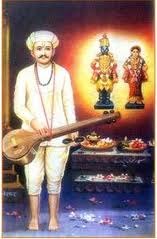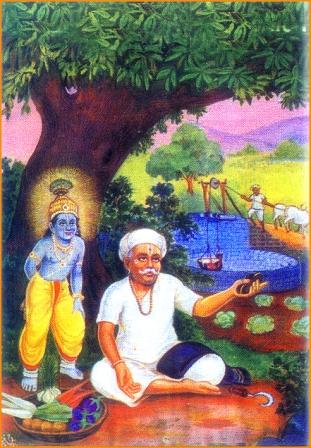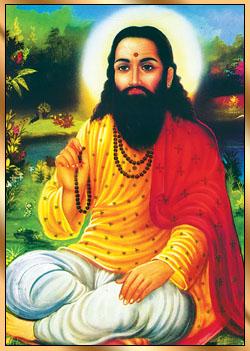NAA, NAAURI, NARENDRA
LORD RAMA, LAKSHMANA & SITA crossing river Ganges by Nishaada king Guha & boatman
LORD KRISHNA with Gopies in Yamuna river Naa, Nauri, Narendra
( The Boat, Boatman, Narendra )
At that time there was almost nobody around the
Narendra ( a tank where Chandan festival
is held ). The wind had calmed down. Even the leaves of the papal tree on the
edge of the tank did not stir. The ripples undulating with the breeze had
automatically gone to sleep in fatigue. A little while ago the chandan ground
had become completely deserted and had taken rest. Even a small creature was
not visible in the vicinity. Just a little before people thronged around. They
congregated for the ‘darshan’ of the deities, Madanmohan, Pancha Parameshwara,
Rama, Krishna, Maa Laxmi, Maa Bhudevi. They dispersed after the deities were
gone to their shrines. The entire atmosphere seemed somehow desolate and
forlorn. The used garlands of the deities lay scattered on the water and the
platform in the tank. Up above the sky was there the silvery moon and near it
veiled a little star twinkling. The demonic clouds at a little distance waited
for a chance to devour them.
It was dead silent, stillness everywhere.
After the Chandan festival, Shri Jagannath had already
returned to the temple quite sometime before. The Grand Road of Shrikshetra had
also become lonely. Very soon the moon also disappeared. The dew drops
glittered on the blades of the grass as though the twinkling stars had shed
tears after the departure of deities.
The two boats were chained to the Chandan ground. In one
boat were seated the deities, Madanmohan, Maa Laxmi, and Maa Bhudevi and on the
other were three deities Rama, Krishna, and Pancha Parameshwar, i.e. Sree
Markanda, Sree Yameswar, Sree Lokanath, Sree Kapalamochana and Sree Nilakantha.
The boatman was feeling sleepy at the prow of the boat where
Madanmohan was seated. Suddenly he woke up with a whispering sound. He was
startled and looked hither and thither, no one was there. Who whispered his
name in a quivering voice, “Boatman ! boatman ! boatman ?”
When he looked around with incredulous eyes the same
quivering voice continued. “.......Boatman.......It’s me.......... I am the
boat, speaking. Won’t you recognize me ? Can’t you recollect my voice?”
The boatman said, “O Boat, haven’t you gone to sleep? What
do you say?”
The boat came closer, he put his hand on his right shoulder
and said reminiscing, “Boatman ! ... today all events of the past Ages dance before
my eyes, I could not sleep.”
“Which event?”
“That thing, which neither you nor I can ever erase from our
minds.”
“Boat?” There was a big question mark on the face of the
boatman. His voice was dry and lifeless. All of a sudden the turban on his head
appeared heavy and he put it on the boat.
The boat asked, “Boatman, can’t you really recollect
anything?”
The boatman stared at the boat in that thin darkness of the
night. He marked his tearful eyes. Holding some jasmine flowers close to his
chest which fell down from the chignon of Maa Laxmi, the boat said, “Boatman, I
am reminded of the incident of the day .......That day also I had the flowers
which fell down from the heads of Radha and Krishna ...... I was so overwhelmed
and acstatic ..... you asked for those used flowers ..... I handed them to you
... Then touching them to your head, you preserved them in the corner of your
clothes tying with a knot ...Do you recollect ?”
The boatman said, “Yes, I can recall everything. With these
reminiscences my body shivers. Yes, the events belong to some Ages.”
The boat noticed. With meditative eyes, the boatman was
trying to recollect the remote incidents and then he stared at him. The boat
heard the voice of the boatman, Boat, I am delving deep into the dead past, the
remote past. Do you remember that day ..... a dwarf, about four feet in height,
under a palm leaf umbrella hurriedly ran towards you, perspiring in the mid-day
sun.”
The eyes of the boat were closed; within the twinkle of an
eye he transported himself to the Satya Yuga. He said, “O yes ! now I remember.
All the people in the boat laughed at the sight of the dwarf hurring under the
palm leaf umbrella ..... a funny scene indeed. How could this dwarf climb up
the boat? How could he get down from it ? Where was his destination ? What is
his identity ?” A series of such questions cropped up.
The boatman said, “All the people who had already got in
shouted, ‘The boat is already filled. Please start, the mid-day sun is above,
the scorching heat is unbearable. I looked at the dwarf. I was enchanted.”
“What happened ?”
“ I gazed at Him in amazement. Something within me
constantly reminded me. He was not merely a dwarf, an object of fun and
ridicule but the Absolute (Param Brahman) proceeding towards you with lotus
feet. I was about to untie the boat and start rowing. I was stuck. My eyes were
riveted on the Dwarf. My grips slackened. I put down the oar on your body; and
my palms joined together spontaneously to pay my obeisance to Him.”
The boat said,”Oh yes ! now I also recall it exactly. When
the people lifted Him on to my body, I was thrilled. I thought, “Who is He?”
The boatman advanced further. “At that time it was beyond
our comprehension thatHe was the incarnation of Lord Vishnu (in the form of a
dwarf) going for alms from the king Bali. When we came to know it later, our
lives became complete and blissful. Is it not ?”
The boat ruminated, “This had happened in the Satya Yuga.
Then do you remember the ‘Treta Yuga ?’
“Yes, I remember. That day, when the two brothers
Kausalyadhan (Lord Rama) and Sumitraprana (Lakshmana) had appeared ........we
were then in the river Ganga.......”
The boat meditatively said,”Oh ! Boatman, taht day Guru
Viswamitra was with them .....at that time the demons created havoc in the conduct
of ‘yajna’. They made in the lives of rishis and sages miserable. Some times
they blew up the sacrificial ingredients, flowers, leaves, wood and even left
excreta into the pit meant for the oblation.”
Now the boatman added, “........Oh! my dear, that day all
the three came to the bank of the Ganga. My eyes were purified and ennobled at
the sight, all the sins of the ages were washed away. The moment I had the
‘darshan’ , the darkness shrouded by the sins of my past lives was dispelled.”
The boat interrupted, “.....Ah, how cleverly you acted on
that day. Without disclosing your real intention, you said to Him cunningly, ‘
No, I can’t ferry you across the river.This boat is only my resource ... I earn
my living by this .... if it turns into
a woman by the dust of your feet like the stone on the road side...’
The boatman said, “ That day Lord Rama gave a smile
appreciating the inner motive of my objection and asked in his nectar-like
voice, “ Then what do you want boatman?”
The boat recapitulated, “ Ah, what a fine solution you gave!
‘ O Lord, if there is dust in your feet and the dust particles fall on my boat,
then only it would become a woman. I know the way out. I will wash your feet,
then dry it with my towel, I will not a single dust particle cling on to your
feet.”
The boatman said, “ My dear!These incidents date back to two
Ages long buried in the sands of time –
do you still remember?”
The boat came closer and uttered, “ Boatman, how can I
forget it? When you have humbly appealed to the Lord, His dearest Lakshmama
could understand your feelings and the smile on his face at that time was quite
revealing.”
The boatman further said, “ But, Biswamitra was worried. He
was apprehensive, so he was in hurry to cross the river.”
Without giving a chance to speak further the boat said. “
Boatman! that day you were rewarded for your virtuous deeds of many births....
you washed the feet of the Lord and I simply stared at you with a feeling of
nothingness, a sense of utter failure and futility. I was deprived of the dust
from the Lord’s feet but for your envy.
You were squarely responsible for snatching away a golden opportunity from me.
How clever you were...! You took the long cherished ‘padukapani’ ( the water
with which the feet of the deities are washed) several times while washing the
feet ! I was really envious of you.”
The boatman said. “ yes, I have also marked it. You were
burning with anger and envy. When I wiped His feet with my cloth, you could not
bear it and objected, “ Lord has been standing there for a long time, let Him
come, ‘ isn’t it?”
The boat replied, “ That day the omniscient Lord had smiled
at my words. Both the brothers put their bows on me. I was really fortunate to
have their bows on my lap. And when the Lord placed His Lotus Feet on me, I
clung to them, I shook on both sides and sprinkled my entire body with His
‘padukapani’. Ah! What an auspicious moment that day....!”
The boatman saw the boat closed his etes and tears rolled
down. Both of them had tears of joy. They recalled their past blissful moments
and preserved them.
All of a sudden the wind blew. The boat shook in the water
of Narendra. Both opened their eyes.
The boatman continued, “ ......Boat, when I ferried them to
the other side of the Ganga, I was in a state of celestial frenzy. Such a big
river seemed to be so small ! Ah, in no time the boat reached the other side of
the river. The effulgent gracious figure would go out of my sight – thinking so
the oar slipped from my hand. You held the Lord’s feet with a tight grip, did
not let them go,”
The boat said, “ Yes dear, I do remember all those things !
The Lord made me understand, ‘Leave me .... release my feet ... I will come
again.’ In tearful eyes i asked , “When... when will your Benign Self appear,
my Lord? If you don’t answer categorically I won’t let you go. Please say, when
will you come!! when!!!
The boat man said, “...Oh my friend, the Lord had moved His
flower-like tender palm on your body and had said, ‘In the age of ‘Dwapara’...
in the river Yamuna... “
The boat continued, “ The Lord stuck to His words. O, how
sincere and loving He is to His devotees. An incarnation of compassion. Do you
remember the events of the age of ‘Dwapara’ ?
The boatman reflected, “Yes, they are etched in many memory.
He stuck to His words and appeared on you many a time in the river Yamuna; the
Lord, with the curling locks of hair adorned with peacock feather, was seated
under the ‘Kadamba’ tree with golden flute in His hands, yellow robes around
the waist and ‘Koustuvmani’ in the eyes – Boat, how fortunate you are!”
The boat said, “And you ?”
“Whether I was there or not, He never waited for me. He
ferried the ‘Gopis’ (the milkwomen) across the river. He teased the Gopis with
fun and sports in the middle of the river. Out of pique and annoyance the
Gopies also poured the milk and curd
that they carried for sale on His body; you witnessed all those playful
activities of the lord, heard the enthralling music of His flute on the bank of
river Yamuna more than me. Do you remember Her ?
“ Whom ? Oh, Maa
Radha ?”
The boatman said, “Yes.”
The boat laughed and said, “Fortunate as I was, I had held
Radha Madhaba on my lap. Ah, what a captivating serene beauty ! On several
occasions the Lord and Maa Radharani have ennobled both of us...... I thought
myself to be really blessed for having the flute of the Lord in my lap a number
of times.”
The boatman asserted, “ Boat, is it not a fact that you got
the Lord on account of me ? If I were not with you ...”
The boat took it amiss and said, “Boatman, have you not
attained fulfilment because of me ? Truely speaking. If I were not there, who
would have ferried the Lord across the river Ganga and Yamuna ? In fact I was
the base.”
Both of them were startled. They heard someone speaking with
a pale face leaning against the boat, “....And me....?”
Both the boat and boatman stared, who ? The oar ?
The oar said emphatically, “If I were not there, it would
not have been possible to row the boat and carry the Lord.”
Both the boat and boatman looked at each other. The oar
asked , “ Why don’t you say anything about me ?
Both of you have completely
forgotten me ! I had met all of them - the Dwarf (Bamana), Rama, Lakshmana, Radha,
Madhaba. My eyes have been purified. Holding me in His fists, the Sweet heart
of Radha (Lord Krishna) rowed the boat across the river Yamuna several times.
In the process the peacock feather on the Lord’s head touched me many a time.”
All the three; the boat, boatman and oar kept quiet for some
time. It was almost dawn. The star Venus had appeared in the eastern sky. The
boat started, “Boatman ! the night passed in no time ruminating about the past
three Ages. And what about the current Age...?”
The boatman said, “ this Age is more scared. Every year for
twenty one days, the Lord comes to this Narendra on the occasion of Chandan
festival with Maa Laxmi and Maa Bhudevi. We take Him round alongwith both the
Mothers in the midst of His servitors. The water of Narendra is sanctified. We
are all blessed....... In all these lies an interrelation of the four Ages –
‘Satya’, ‘Tretaya’, ‘Dwapara’, and ‘Kali’. Three Ages are over – the fourth one
is going on.
All the three, the boat, boatman and the oar held the used
flowers of the deities, Sri Jagannath, Laxmi, Bhudevi, close to their chest.
Tears rolled down from their eyes.
The boat asked, “The night would be over, the sun would rise
and the day would pass, again the Lord would come with all his companions. What
is the time now?”
The boatman said, “It seems this night won’t pass !”
The oar said, “The night would be over and then the day
break. The Lord seated on the gem-palanquin would arrive from the temple. Oh !
how much time left ?”
The boat, boatman and the oar observed Narendra speaking
with its stirring ripples, “ I am also waiting for Lord Jagannatha.... When
would He come ?”
Narendra with its undulating surface eagerly waited for that
blissful moment. One thought in everybody’s mind : that the Lord would come
again...... his benign presence on the auspicious occasion of boating. Taking
an opportune moment Maa laxmi would throw flowers and the water of Narendra on
to the Lord. The nectar like smile would flow from His lips. The devotees on
the pulpit and around would attain fulfilment at this heavenly sight.
All of them were eagerly waiting for the arrival of the
lord.
The Boat .....
The Boat – the Boatman .......
The Boat – the Boatman – the Oar .....
The Boat – the Boatman – the Oar – Narendra.
*** *** ***
Source : From the book "Lord Jagannath in the Stories of Experience"
Author: Sri Rabindra Narayan Mishra (in Oriya Language)
Translator : Sri Suman Mahapatra
(Permission of Sri R.N.Mishra taken to bring it to my Blog. )
**********************************************************************
































 Born in Mandur near Kashi, bhakta–poet Raidas was the son of a cobbler. It is a general consensus that he was born in Samvat 1433 (1377 CE), on Magh sud 15 (Purnima). Since the day was a Sunday, he was named Ravidas, which later became Raidas in Hindi and Rohidas in Gujarati.
Born in Mandur near Kashi, bhakta–poet Raidas was the son of a cobbler. It is a general consensus that he was born in Samvat 1433 (1377 CE), on Magh sud 15 (Purnima). Since the day was a Sunday, he was named Ravidas, which later became Raidas in Hindi and Rohidas in Gujarati.